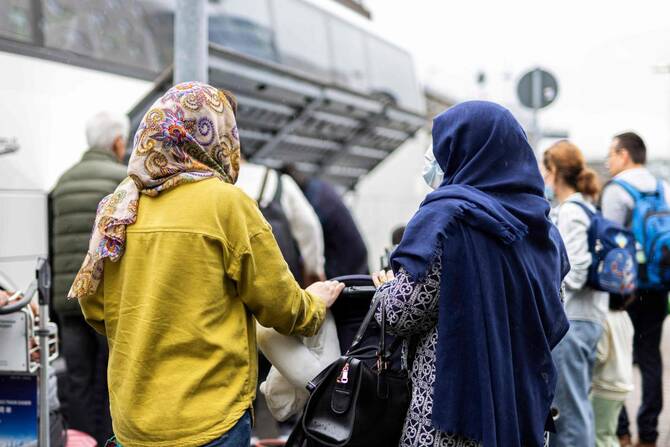HANOVER (AFP): A group of 47 Afghans who fled the Taliban arrived in Germany on Monday after months of waiting in Pakistan until German court rulings forced Berlin to offer them refuge.
The 10 families have been among more than 2,000 Afghans caught in limbo in Pakistan as Germany’s conservative-led government this year froze a program to offer them sanctuary.
Most of them arrived in Hanover on a commercial flight from Istanbul around 2:00 p.m. (1200 GMT), said an AFP reporter and the Airbridge Kabul initiative set up to help those affected.
An interior ministry spokeswoman confirmed that “45 Afghan nationals entered Germany. These are all individuals who obtained visas through legal proceedings… All of these individuals have fully completed the admission procedure and security screening.”
The Airbridge Kabul initiative later said that two more people had arrived after catching a later connection from Istanbul.
A mother and daughter who did not want to give their names told AFP they were looking forward to their new life in Germany.
“It feels very good and pleasant when girls can go to school, study, and I can also work, study, integrate into society, and learn the language,” the mother said.
“I am very happy that after many difficulties and challenges, we finally managed to reach a good life,” said the daughter, aged 20.
“I could have done many things, studied, achieved a position and reached the goals I had for myself, but unfortunately, I couldn’t. From now on, I will achieve them,” she said.
Sanctuary scheme
After the Taliban returned to power in 2021, Germany set up a scheme to offer sanctuary to Afghans who had worked for German institutions or were otherwise deemed at high risk of persecution, including rights activists and journalists.
But the scheme was frozen under conservative Chancellor Friedrich Merz, who took office in May, as part of a wider crackdown on immigration.
While the Afghans have been left stranded in Pakistan, authorities there have also stepped up a crackdown on Afghans living in the country without residency.
Last month, Berlin said around 450 Afghans waiting to come to Germany had been detained, and more than 200 of them were sent back to their Taliban-run homeland.
While alarm has grown about their fate, Germany has agreed to resume accepting some of the others.
The government said last week that Afghans for whom “courts have found that Germany is legally obliged to issue visas” would travel to Germany “in stages” once they had cleared security checks.
The 10 main applicants who arrived on Monday were eight women and two men who had been involved in “politics, the justice system and journalism,” said Eva Beyer, a spokeswoman for the Airbridge Kabul initiative.
Around 85 other stranded Afghans have begun legal proceedings against Germany, “and there are more every day,” Beyer said.







